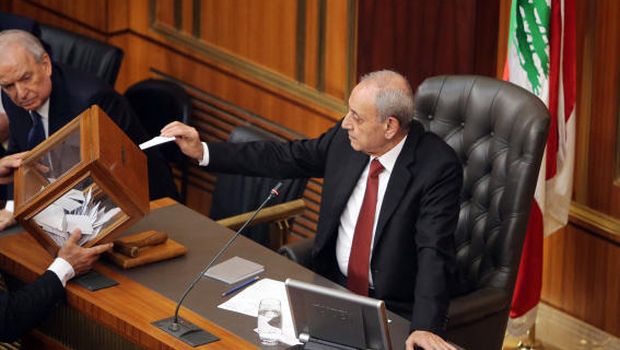
Lebanese parliament speaker Nabih Berri casts his vote to elect the new Lebanese president in the parliament building in downtown Beirut on Wednesday, April 23, 2014. (AP Photo/Joesph Eid, Pool)
Beirut, Asharq Al-Awsat—Lebanon appeared no closer to choosing a successor to President Michel Suleiman a day before the third round of voting, set to take place on Wednesday.
The outgoing Lebanese president presided over his last National Dialogue meeting at the Baabda Presidential Palace on Monday, a session that was conspicuously boycotted by a number of parties amid continuing disagreement between the two largest political blocs in the country, the March 8 and March 14 alliances.
Lebanese politicians praised Suleiman as a consensus-builder and called for Lebanon’s next president to follow the same moderate line. The session was boycotted by the Hezbollah-led March 8 Alliance and some members of its rival, March 14.
Speaking during the session, former Prime Minister Fouad Siniora warned of the repercussions of a presidential vacuum. He said: “Unfortunately, we have not so far succeeded as Lebanese and as lawmakers in electing a new president. This is the responsibility of everyone. There is fear that we might reach the constitutional deadline without the election of a new president.”
Local media reported on Tuesday that Maronite Patriarch Bishara Al-Rahi is seeking to extend Suleiman’s term in office by one year to avoid a power vacuum in Lebanon amid the lack of movement from both sides.
Under Lebanon’s complex, confessional-based political system, the presidency—elected by a secret ballot of MPs—is traditionally reserved for members of the country’s Maronite Christian community.
Suleiman’s term expires on May 25, but this has been thrown into doubt as the Hezbollah-led March 8 Alliance remains staunchly opposed to March 14’s Samir Geagea and the Progressive Socialist Party’s Henri Helou, and have yet to put forward a candidate of their own.
Michel Aoun, the presumptive March 8 candidate, had earlier said he would only run as a “consensus” candidate.
No candidate was able to secure a majority during the first round of voting, while a second session was unable to raise a quorum as a result of a boycott by members of the March 8 Alliance. A fresh round of voting is scheduled to take place on Wednesday, though few Lebanese political analysts expect a breakthrough.
Kataeb Party leader Amine Gemayel, a key member of the March 14 Alliance, announced that he plans to begin consultations with the March 8 Alliance to establish a mechanism to elect a new “consensus” president. Sources close to Gemayel, himself a former president, had earlier said he would put his name forward for the post, despite an agreement by members of March 14 to back Geagea.
Speaking to reporters following the Kataeb Party’s weekly meeting on Monday, Gemayel said: “The presidential election can only take place on time if we communicate and take into account the national interest above all others . . . Should the situation continue as it is, it will have a destructive impact on all institutions and the fate of the country.”
Meanwhile, the Future Movement—the leading party in March 14—called on its rivals to attend Wednesday’s vote and present a candidate of their own.
“The Future Movement, which has supported the candidacy of Lebanese Forces leader Samir Geagea, calls on the March 8 coalition to [choose] a candidate for the upcoming parliamentary session in order to prevent a vacant president’s seat,” the party said in a statement on Tuesday.
US Ambassador to Lebanon David Hale called on Lebanese lawmakers to “seize the opportunity” to elect a new president without foreign intervention.
In an op-ed published by Lebanon’s An-Nahar newspaper, Hale wrote: “Lebanon must seize this opportunity and, following constitutional timelines and processes, elect a new president without allowing any other country to dictate the results. The United States supports this Lebanese process.”
